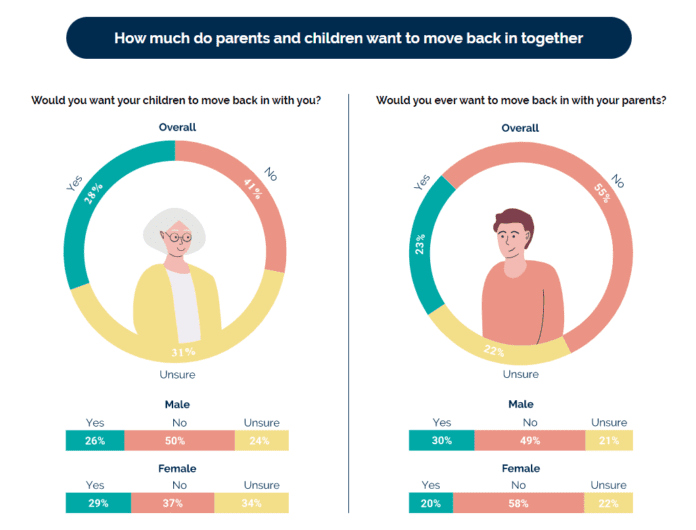28% of parents also want their children to move back in with them
Over a quarter of parents want their children to move back home, data reveals
- 28% of parents would like their children to move back in with them, compared to 23% of children
- Sons are more likely to want to move home than daughters
- 45% of children miss having a larger disposable income after they have moved out
A new study has revealed that a growing number of Brits want to live together as a family again.
28% of parents would like their children to move back in with them, a feeling that is replicated by 30% for sons and 20% for daughters.
The findings come as thousands of young people prepare to move out of the family home and head to university. David Wilson Homes explored how this move can change the family dynamic.
The housebuilder surveyed 2,000 Brits to reveal the things that both children and parents miss and enjoy the most about living together. The study also revealed how often children visit their parents after moving out, as well as the most common things parents still do for their children after they have moved out.
Sons more likely to want to move back in with their parents than daughters
| Would you ever want to move back in with your parents? | |||
| Overall | Male | Female | |
| Yes | 23% | 30% | 20% |
| No | 55% | 49% | 58% |
| Unsure | 22% | 21% | 22% |
| Would you ever want your children to move back in with you? | |||
| Overall | Male | Female | |
| Yes | 28% | 26% | 29% |
| No | 41% | 50% | 37% |
| Unsure | 31% | 24% | 34% |
The study found that 23% of children who had already moved out of their parents’ house said yes when asked “would you ever want to move back in with your parents”. Males are more likely to want to move back in than their female counterparts, with 30% of males agreeing compared to 20% of females.
It was also revealed that parents are more likely than the children to want to move back in together. 28% of parents want their children to move back in with them compared to 23% of children.
Half of Brits visit their parents at least once a week after moving out
| How often do children visit their parents after moving out? | |
| Frequency | % that visit this often |
| Every day | 3% |
| 4-6 days a week | 7% |
| 2-3 days a week | 16% |
| Once a week | 24% |
| Once every 2 to 3 weeks | 14% |
| Once a month | 10% |
| Once every 2 months | 7% |
| Once every 3 to 5 months | 8% |
| Once every 6 months to 11 months | 4% |
| Once a year | 3% |
| Never | 3% |
The research also revealed that one in two children (51%) visit their parents at least once a week after moving out. 27% will visit multiple times per week, with one out of 10 children visiting at least four times per week.
75% of children will visit their parents at least once a month, with sons and daughters both equally likely to visit the same amount.
Children miss having their meals made for them the most
| Top 10 things children miss about living with their parents | ||
| Aspect of living with your parents | % of children that miss this aspect | |
| 1 | Meals made for you | 49% |
| 2 | Their company | 49% |
| 3 | Having more disposable income | 45% |
| 4 | Eating together | 40% |
| 5 | Being taken care of when ill | 37% |
| 6 | Someone to do your laundry | 36% |
| 7 | Watching TV together | 32% |
| 8 | Family pet | 29% |
| 9 | Free car rides when needed | 25% |
| 10 | Bigger house | 24% |
Having meals made for you and the company of your parents are the comforts that children miss the most after moving out. One in two British children (49%) claimed that they missed these aspects of living with their parents.
One of the biggest adjustments children face when moving out is the impact on their finances. Therefore, it’s no surprise that nearly half of Brits (45%) miss having a larger disposable income.
Other sentimental reasons why children miss living at home include eating together as a family and being looked after when they’re ill.
Source: https://www.dwh.co.uk/living-with-parents-nostalgia

| [donate]
| Help keep news FREE for our readersSupporting your local community newspaper/online news outlet is crucial now more than ever. If you believe in independent journalism,then consider making a valuable contribution by making a one-time or monthly donation. We operate in rural areas where providing unbiased news can be challenging. |






















